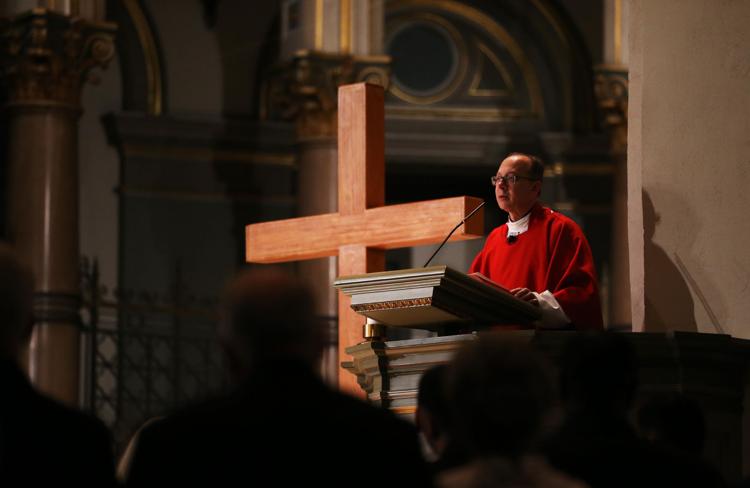Former Catholic Priest Who Served in Blacksburg Among 6 More Clergy Linked to Child Sexual Abuse
By Andrew Adkins
The Catholic Diocese of Richmond added six priests to a list of clergy who served in the diocese and were accused of sexual abuse against a minor, bringing the total to 49. Five of the six men whose names were announced Thursday are dead, while the status of one priest is unknown, the diocese said. One of the men, Stanley F. Banaszek, served as a priest at St. Mary’s Catholic Church in Blacksburg and as a chaplain at Virginia Tech in 1974-75, according to an advocacy group for victims of clergy sexual abuse. That brings to seven the number of former clergy on the Richmond diocese list with past ties to the region spanning from Bedford to Blacksburg. The diocese initially published the list of clergy in February. The new names were added after “additional information was brought forward and a review was completed in consultation with the Diocesan Office of Safe Environment,” it said in a statement. “Back in February, when we published a list of clergy against whom there are credible and substantiated claims of child sexual abuse, we acknowledged the list would be updated,” said Bishop Barry Knestout in a news release. “As we continue to engage with survivors of abuse and learn more about the history of our diocese, we continue our commitment to transparency. It is my sincere hope that the additions of these individuals will help provide healing for anyone who suffered at their hands.” The priests were accused of sexually abusing a minor either while working in the Catholic Diocese of Richmond or elsewhere. The diocese did not release specific details of the abuses “out of respect for the privacy of survivors,” the statement said. The five additional clergy confirmed deceased by the dioceses are Banaszek, Anthony M. Canu, Patrick J. Cassidy, Leonardo G. Mateo and Thomas D. Sykes. The status of Vincent The Quang Nguyen is unknown, according to the diocese. Banaszek, Canu and Mateo worked in the Diocese of Richmond and had allegations of abuse elsewhere. Sykes was listed as a priest of another diocese with allegations of abuse that occurred in the Diocese of Richmond. Cassidy was a priest of the Diocese of Richmond and had assignments in Charlottesville among other Virginia localities, the diocese said. The diocese only listed the assignments of priests of the Diocese of Richmond, such as Cassidy. After serving in Blacksburg, Banaszek relocated to Central America before serving in Bridgeport, Connecticut, in the mid-1980s, according to BishopAccountability.org Inc., an advocacy group based in Massachusetts. Bonaszek was accused of sexually assaulting a former altar boy while at the Bridgeport church in 1985, according to a 2009 report by the Connecticut Post. Banaszek was removed as a priest in 1992 and died in 2007, according to the Catholic Diocese of Richmond. Terry McKiernan, a member of BishopAccountability.org’s board of directors, said Banaszek’s time in Blacksburg is documented in the 1975 volume of the Kenedy and Sons Official Catholic Directory. Knestout also announced Thursday a new policy that changed the name of a school in Virginia Beach. He said all diocesan institutions, schools and parish buildings can no longer be named after a bishop, pastor, founder or individual. The only name that requires a change is Bishop Sullivan Catholic High School. Walter Sullivan was bishop of the diocese from 1974 to his death in 2003. The school returned to its former name of Catholic High School. The policy doesn’t affect previously named rooms or wings in diocesan buildings, institutions, parishes or schools, or signs recognizing donors or for historic figures who held an office with a diocesan institution. “Overcoming the tragedy of abuse is not just about holding accountable those who have committed abuses, it is also about seriously examining the role and complex legacies of individuals who should have done more to address the crisis in real time,” Knestout said. “The continued honorific recognition of those individuals provides a barrier to healing for our survivors, and we want survivors to know that we welcome and support them in our diocese.”
|
.
Any original material on these pages is copyright © BishopAccountability.org 2004. Reproduce freely with attribution.
